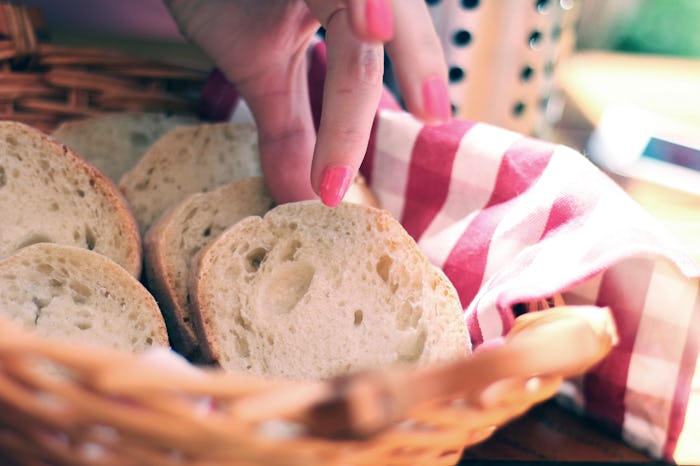Life

Here's What Happens When You Cut Out Carbs
Sometimes it feels like no one's eating carbs anymore. Between being gluten-free (for medical reasons or otherwise), Paleo, low-carb, ketogenic, and, I'm sure a million other diet and lifestyle options that emphasize eschewing the bread basket, well, it feels like carbs and society are on-the-outs. If a few too many endless breadsticks have you considering whether or not to cut back, you might be wondering about the things that happen to your body when you stop eating carbs.
First off, regardless of what your best friend's sister-in-law told you, it's really difficult to stop eating carbs altogether. According to Self, carbs are found in everything from fruits and vegetables to grains to dairy products. So, essentially, low-carb, not no-carb, is what we're dealing with in most cases.
Additionally, complex carbohydrates — the ones found in fruits and veggies, whole grains, and dairy — are very important fuel for your body. According to Greatist, you probably shouldn't cut carbs to the extreme unless told to do so by your healthcare provider. Carbs are your body's primary source of energy, which allows you to rock out a fitness class, digest your food, and otherwise function. Many people, however, claim they feel better once attempting to mindfully control their carbohydrate intake. If you think cutting back on carbs might be right for you, here's what you can expect might happen next.
1You Get Sick
OK, so you're not really sick, but people who cut out carbs often catch what's called the "Low-Carb Flu." Marie Spano, a dietitian and strength coach, told Women's Health that when you first cut carbs, you often come down with flulike symptoms because your body has to adjust to running on a different source of energy called ketones. Since carbs are the body's main energy source, adjusting to using ketones, which are fragments of carbon, for energy takes a little bit of time and temporarily challenges your body.
2You Burn Fat
So you've removed a good portion of your body's main source of energy. How does your body function? Without carbs as a source of energy, your body finds energy in fat, which means you may burn more stored body fat on a low-carb diet, according to Business Insider.
3Your Breath Stinks
It's embarrassing, right, when you're pretty sure your breath stinks? When you cut out carbs, those ketones your body is running on can make your breath stinkier than before, according to Cosmopolitan. More ketones means the worse your breath smells.
4You Become Less Hydrated
According to a 2010 study published in the Journal of Pediatrics, eating patterns that are high in protein and low in carbs can make people thirsty. Also, as Spano told Women's Health in the aforementioned article, when carbs are stored in the body, they also store water. That means that when you cut back on carbs and your body uses up those energy stores, that stored water is gone, as well.
5You Become Constipated
Obviously an uncomfortable dietary side effect, constipation from cutting carbs is due to a lack of fiber, which is provided by those carbs you've eliminated. Keri Gans, a registered dietitian and author, told Greatist that keeping your body in a state of ketosis can lead to constipation. Ketosis is the state your body enters when it's producing ketones to use as energy.
6You May Hurt Your Kidneys
Yes, really. Eliminating carbs, or even cutting back too much, can tax your kidneys. Bridget Murphy, a registered dietitian based in New York, told Women's Health in the previously mentioned article that ketones are acidic, which can make your blood acidic. Since it's your kidneys' job to filter your blood, acidic blood can be problematic for them. Kidney stones and bone loss could result from increased acidity, as reported in a study published by the American Journal of Kidney Diseases.
7You're Moodier
Saying goodbye to much of your carbohydrate intake can make you more irritable. According to TIME, research published in the Archives of Internal Medicine in 2009 found that those who severely restrict their carb intake have more bad moods than those who don't. So you're not necessarily wrong when you say that pasta makes you happy.
8You Can Lose Muscle
So here's the deal, after your body has worked through stored carbs (glycogen) and burns some body fat, it'll go looking for yet another source of energy. According to Rush University Medical Center, when you've run out of the glycogen stores in your muscles, your body starts to use the protein in your muscles as energy. Not great over a long-term period.
9You'll Feel More Tired, Or You'll Have More Energy
Some people have found that cutting carbs makes them feel sleepy and lethargic, while others claim they've never felt more energized. Lowering carbs lowers blood sugar, as Ruth Kava, Ph.D., RD, and senior nutrition fellow at the American Council on Science and Health told Cosmopolitan in that same article. Lowered blood sugar can make you feel tired, which is what can happen when your energy slumps in the afternoon. A writer at Rodale's Organic Life, however, cut out grains, specifically, and found that her energy level stays consistently higher when she avoids grains of all kinds. So your guess is as good as mine.